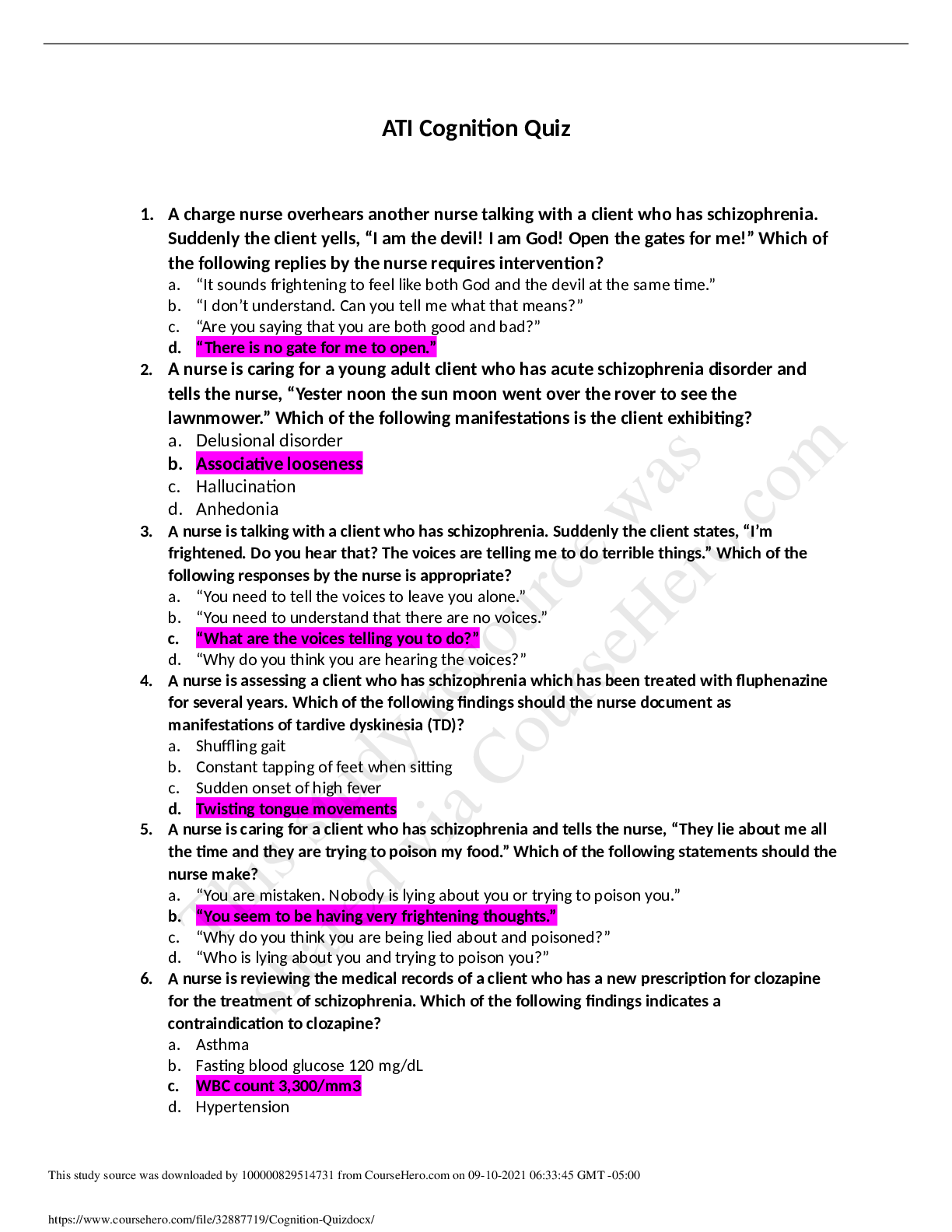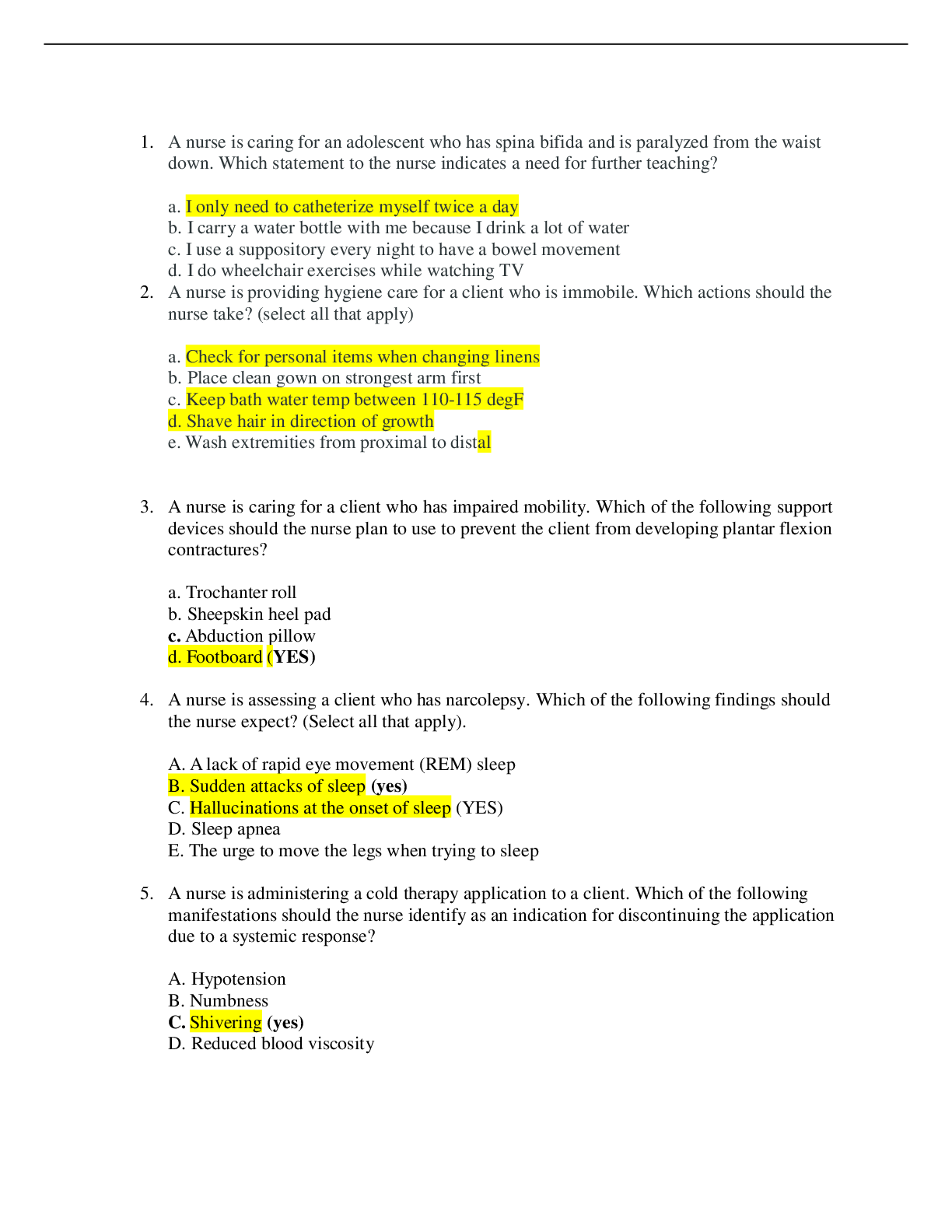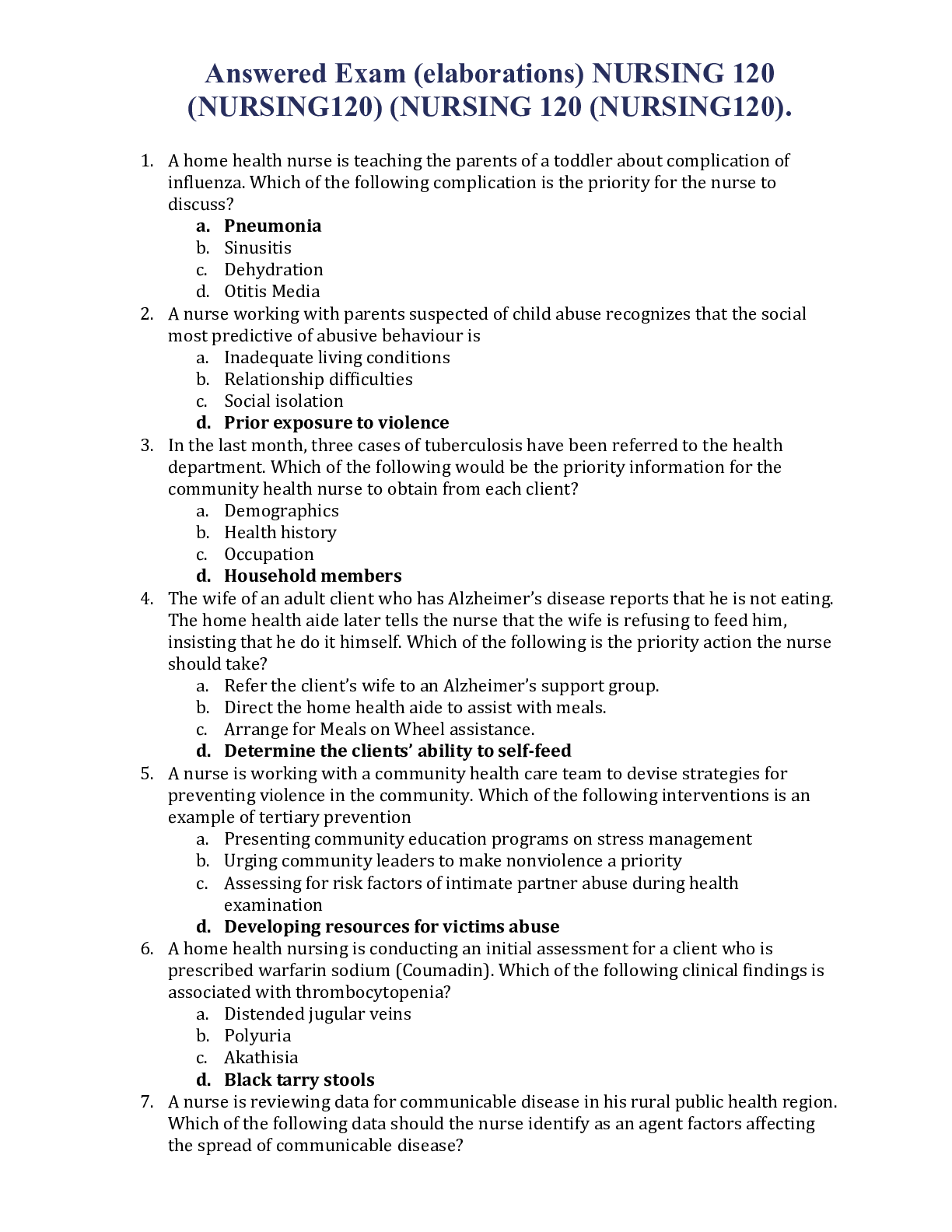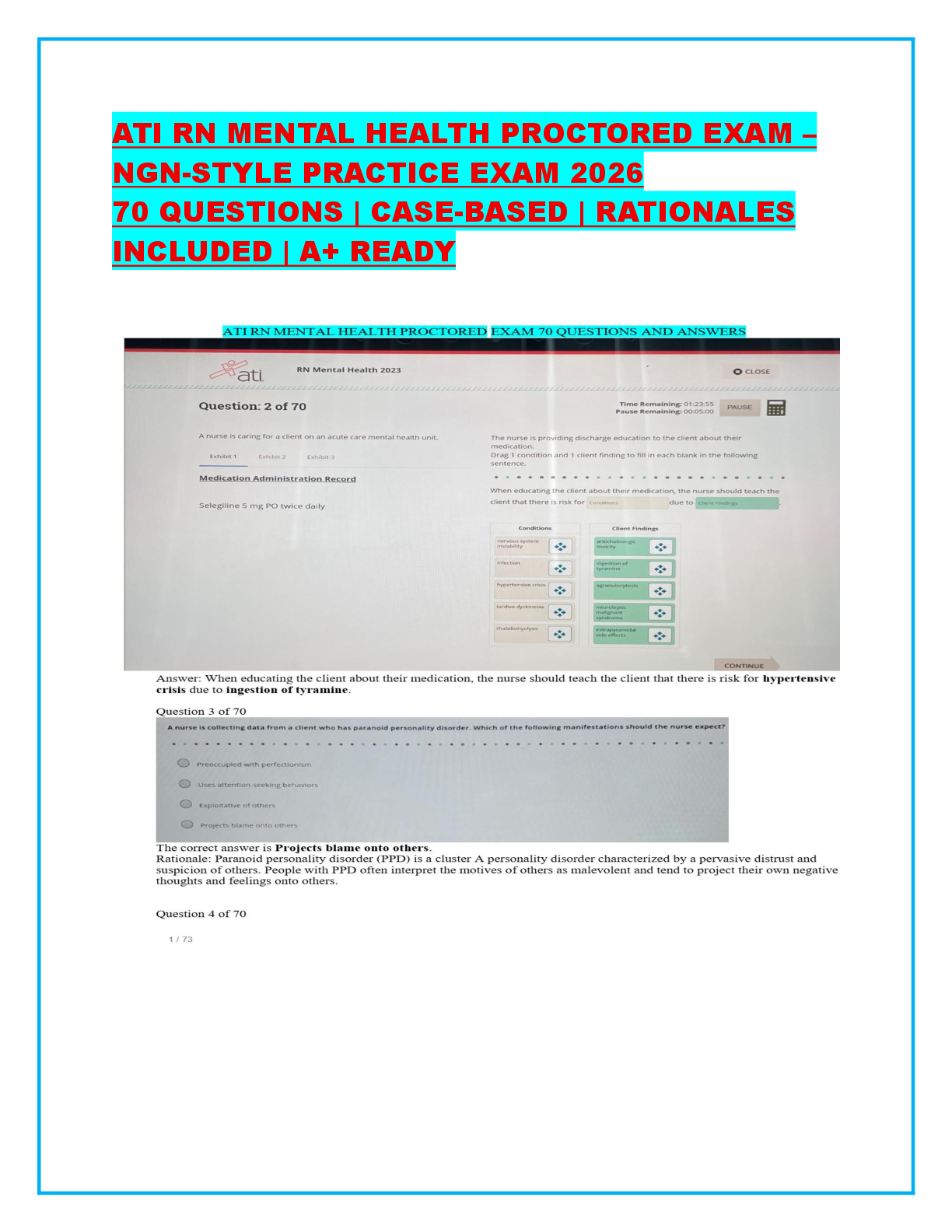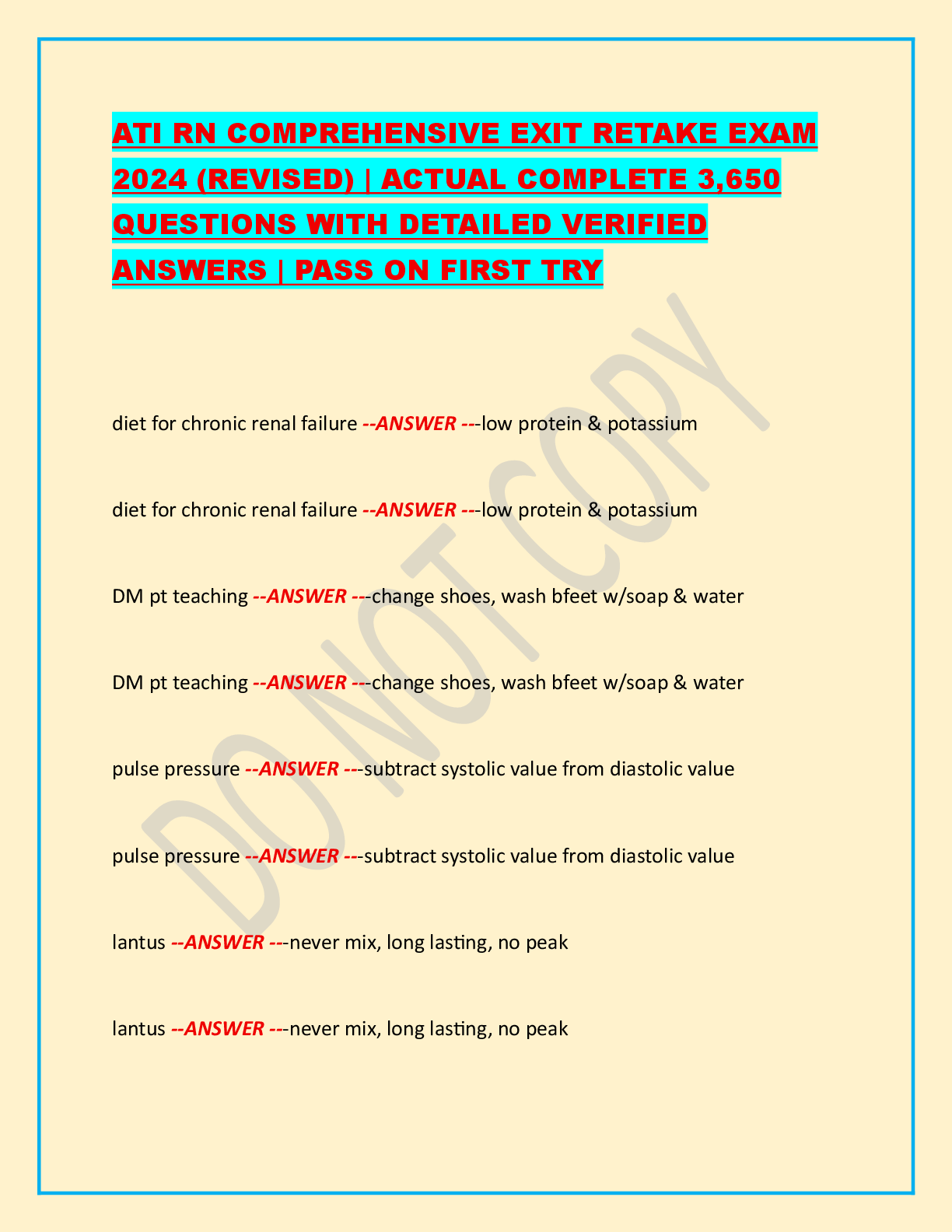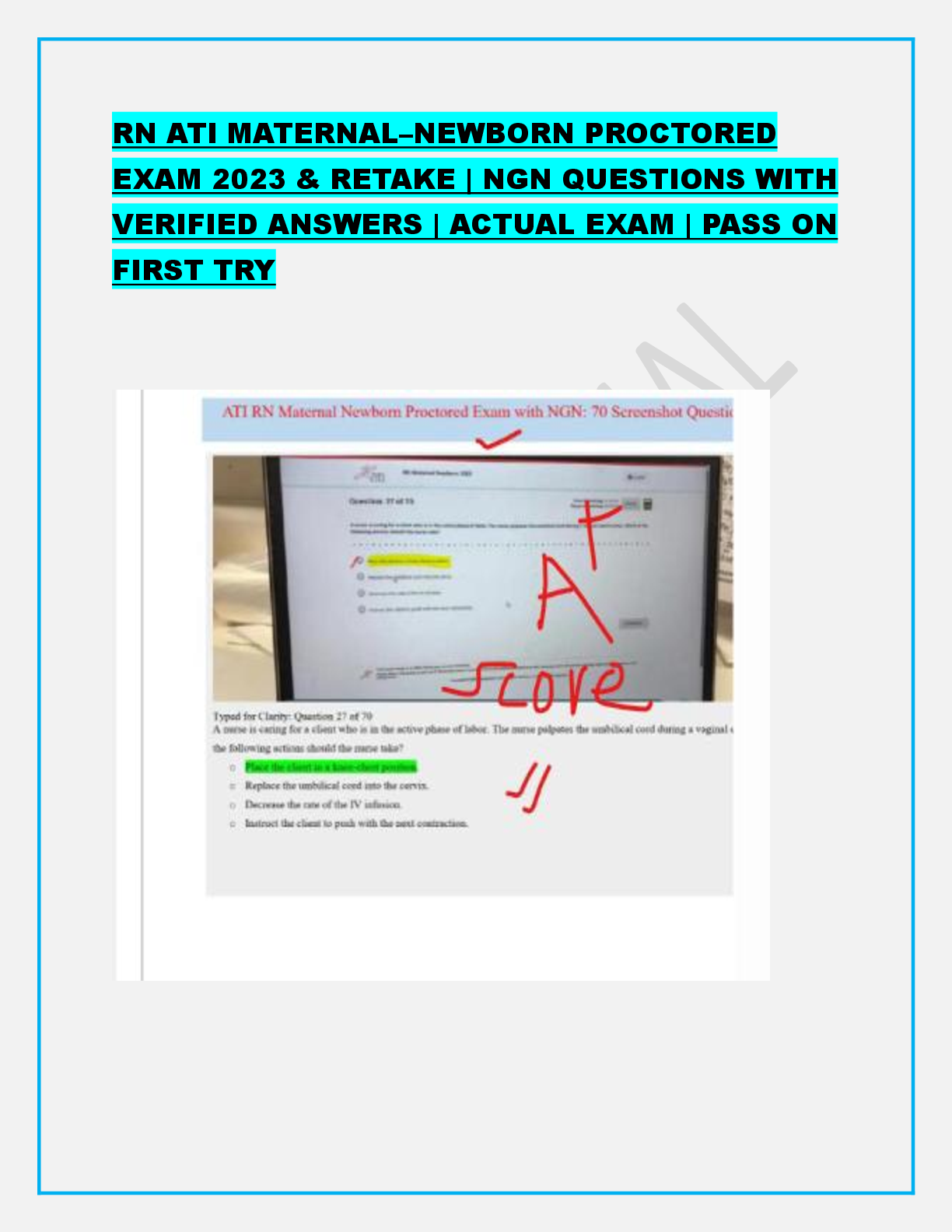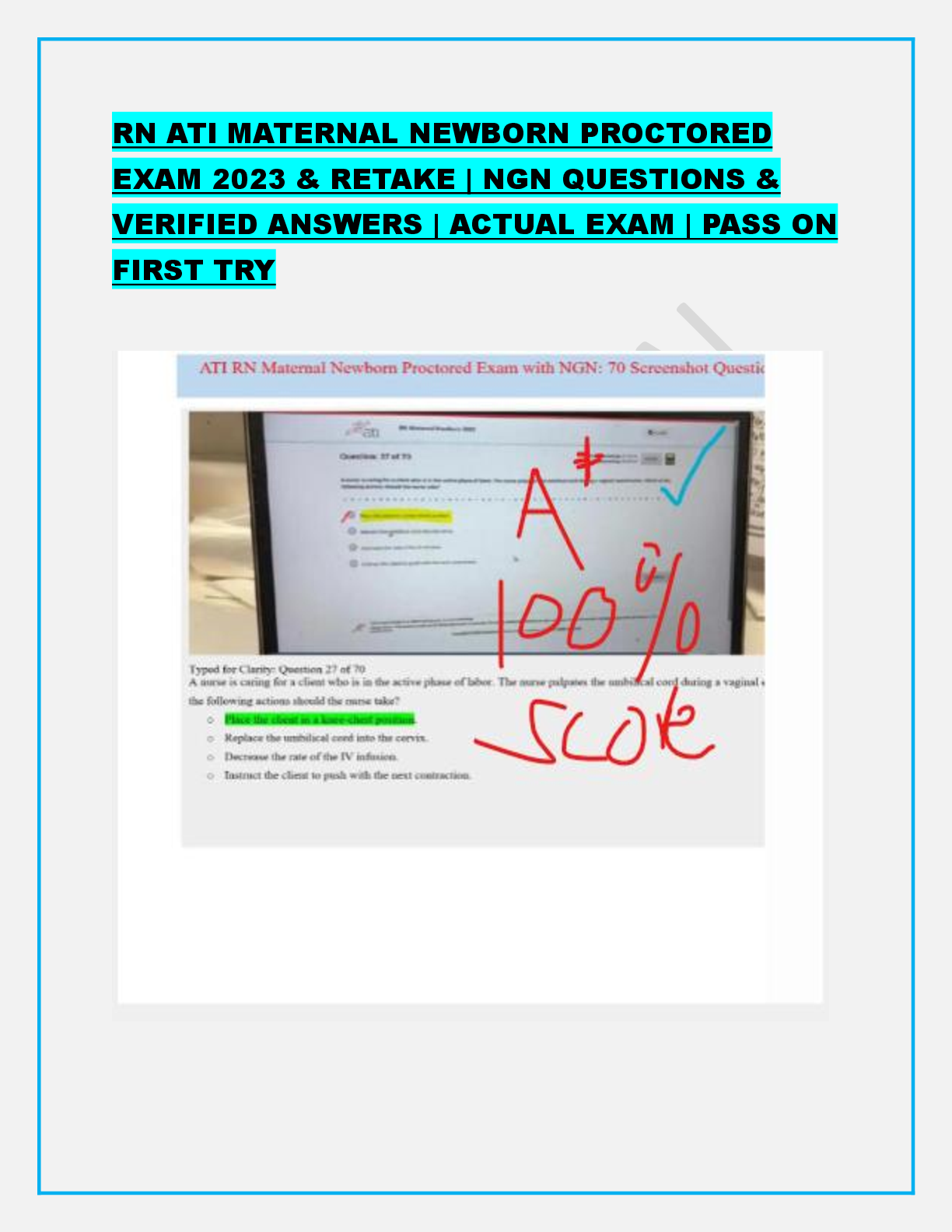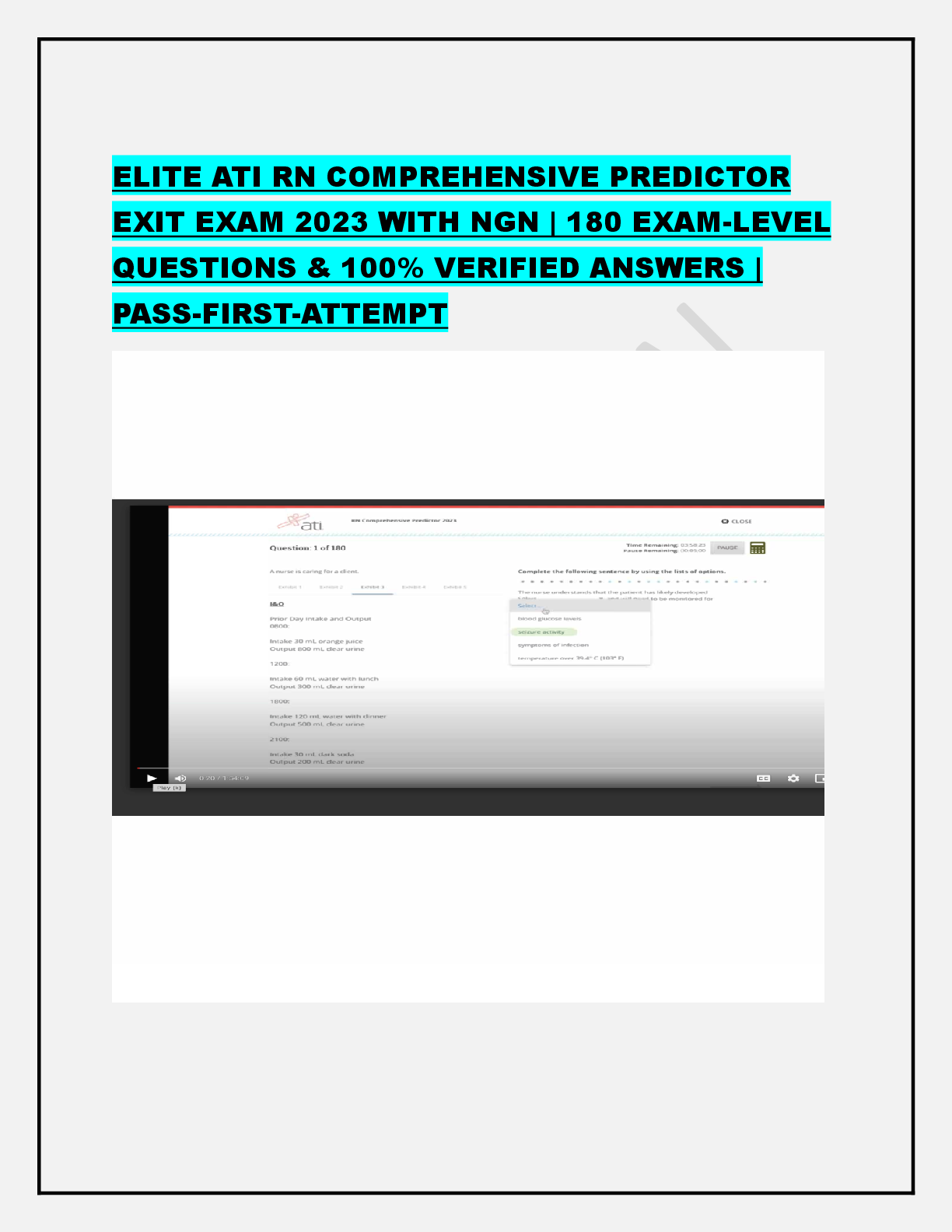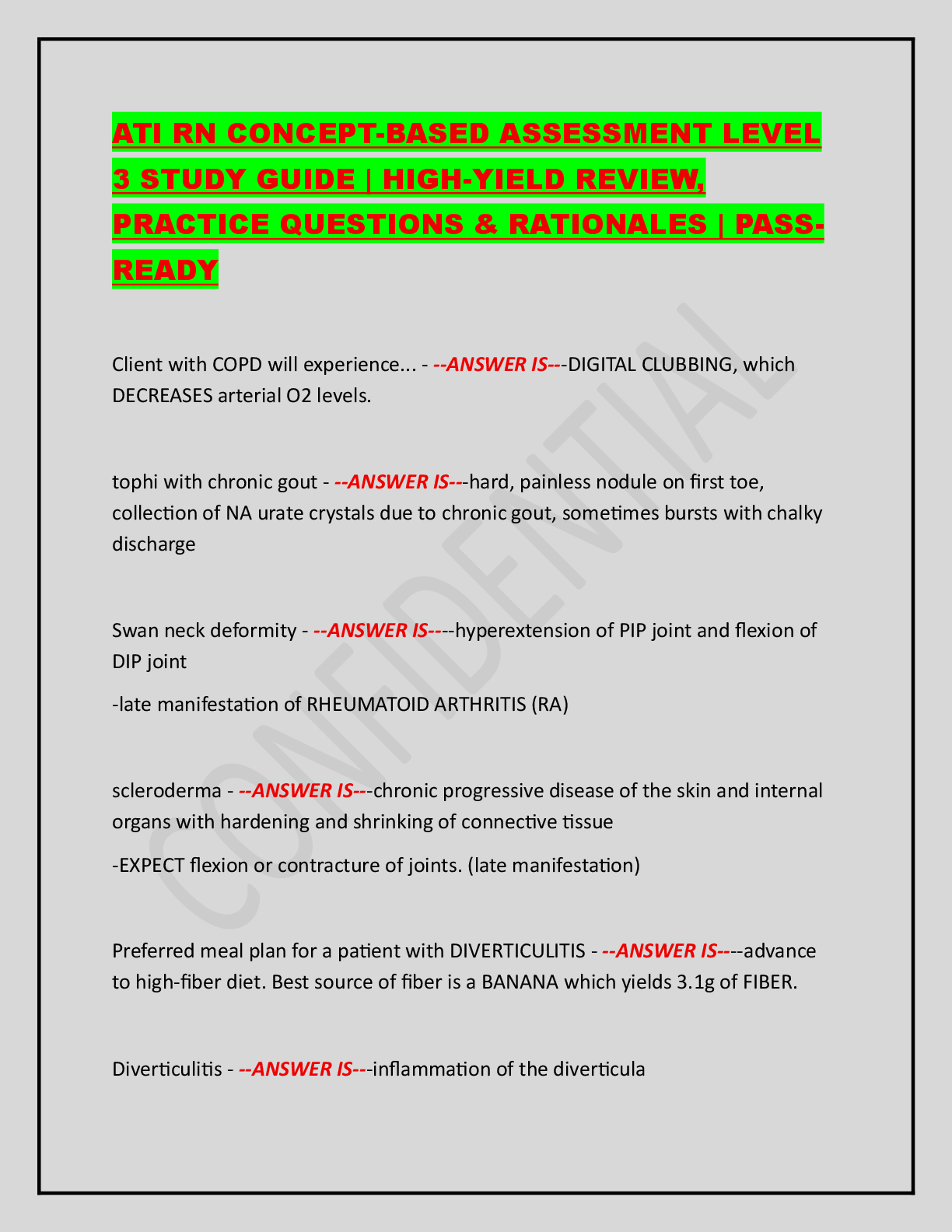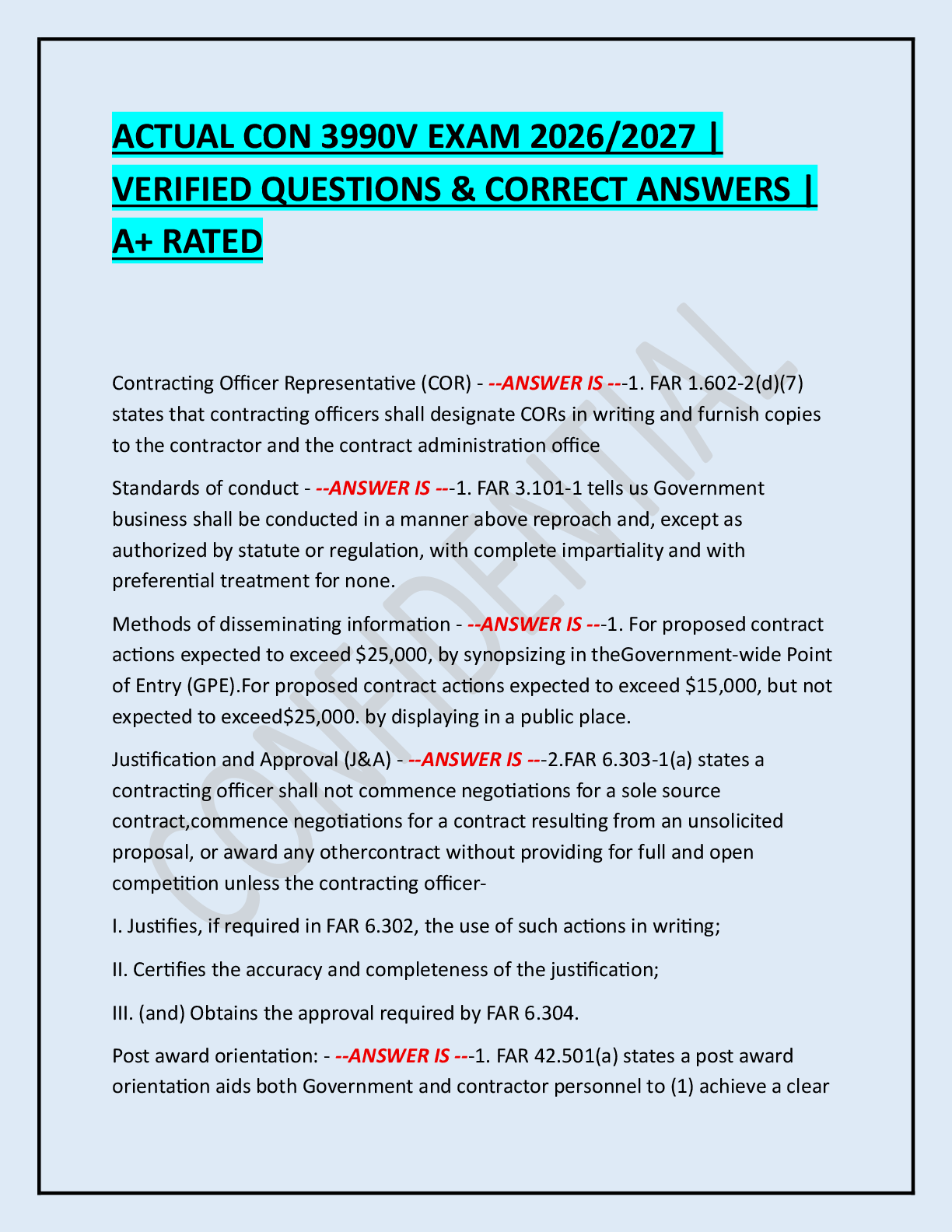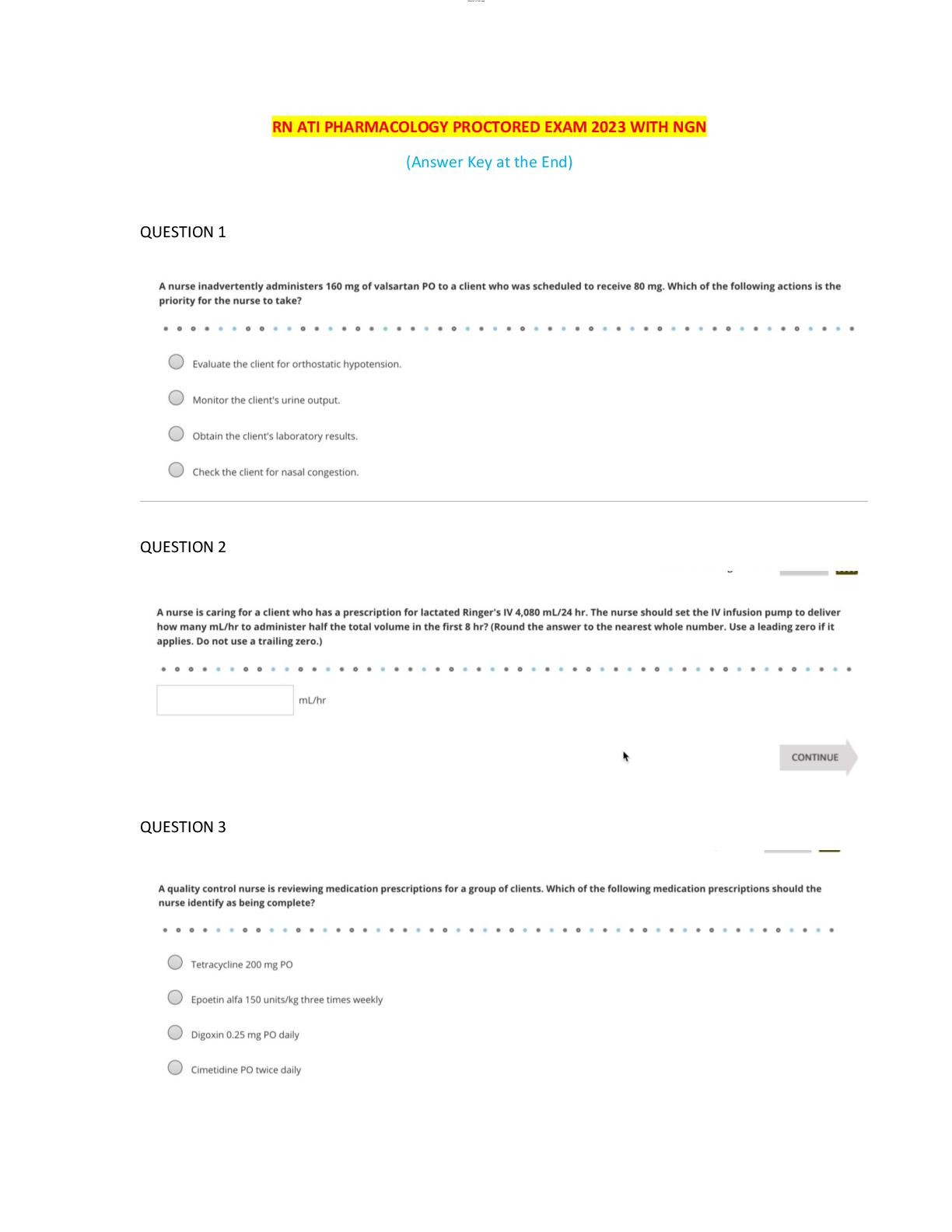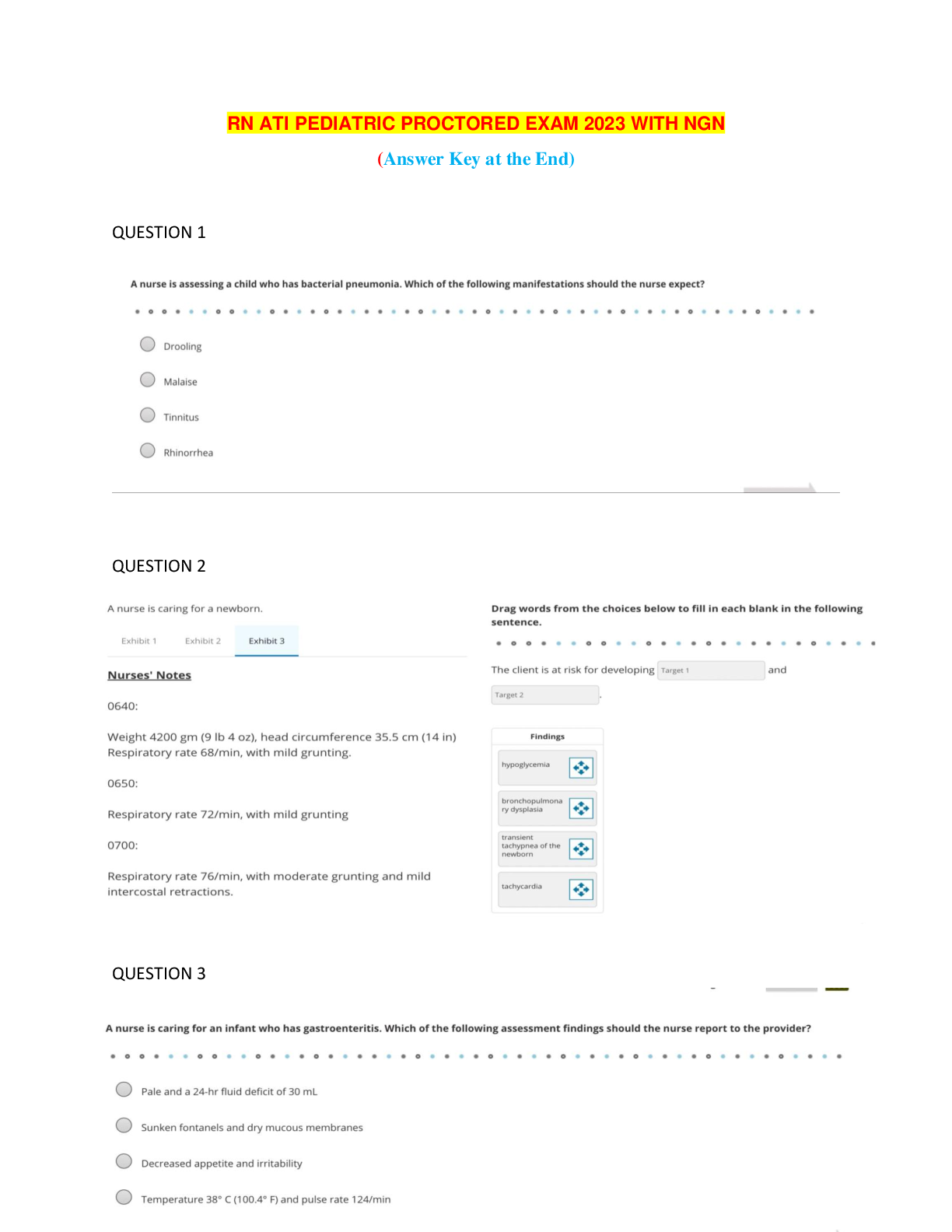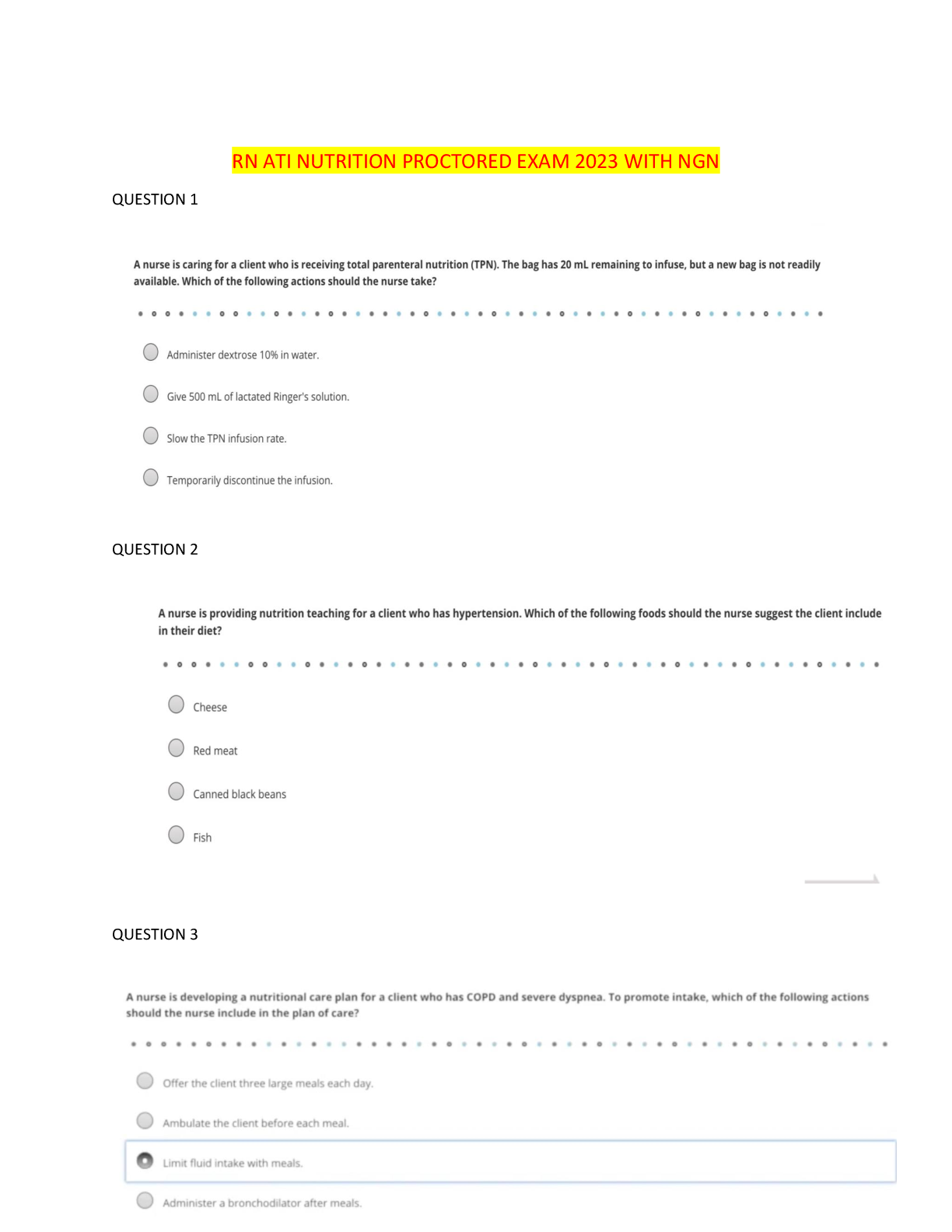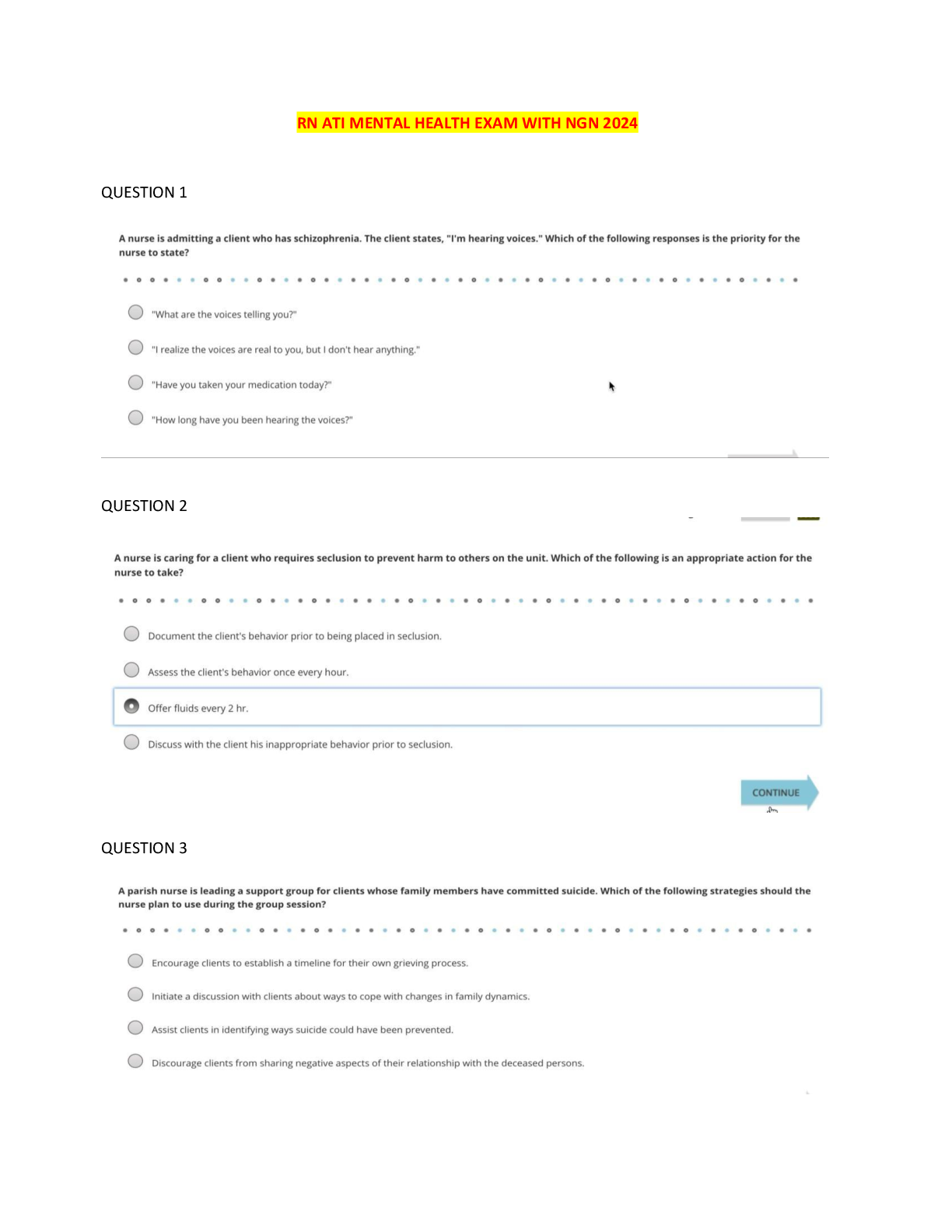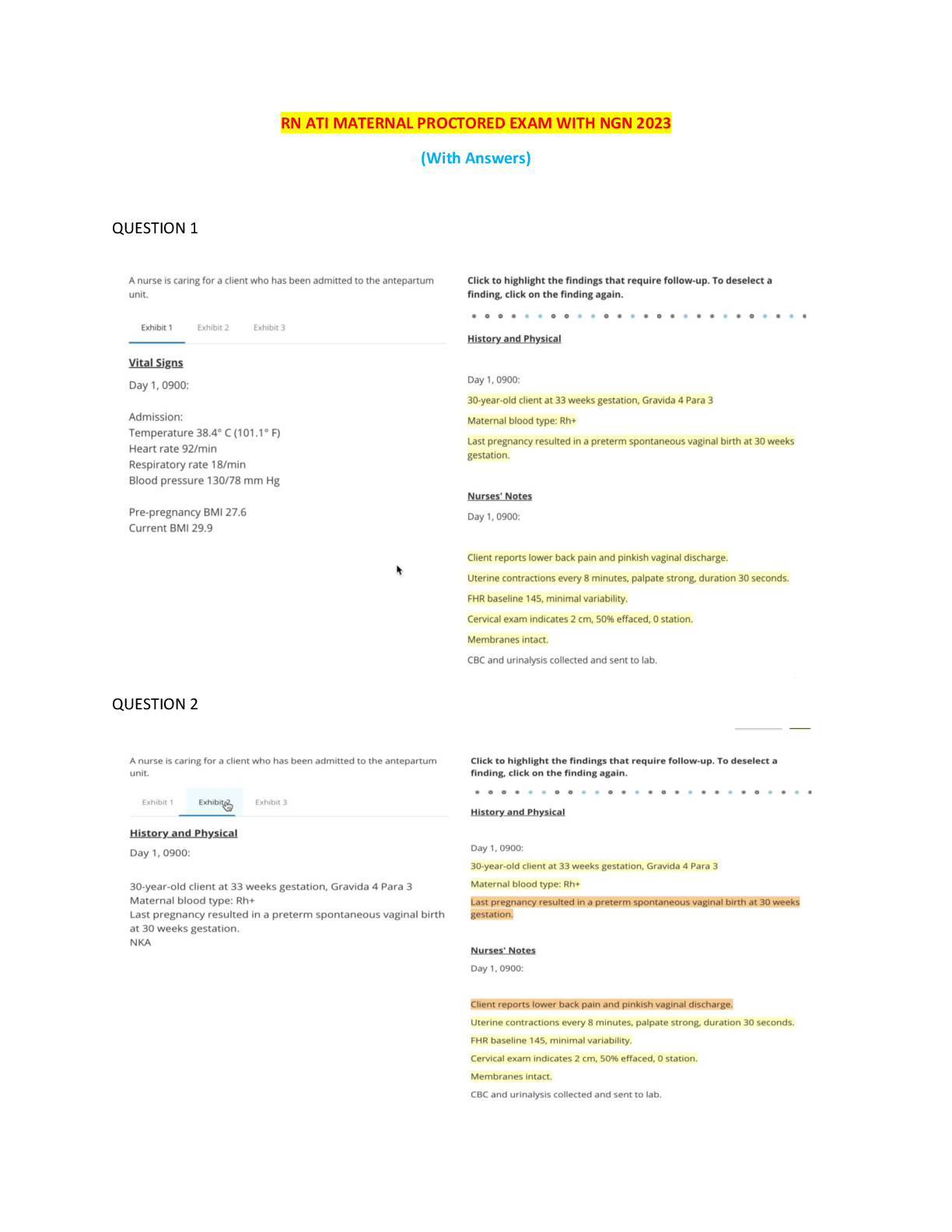ATI RN Mental Health online practice 2013 B
Document Content and Description Below
1. A nurse is performing an admission assessment for a client who voluntary entered an outpatient mental health crisis facility. The client states, “I’ve lost control of everything in my life!” ... which of the following questions should the nurse ask first? a. “What has helped you to cope with a crisis in the past?” b. “Who can we call to support you during this crisis?” c. “Are you having thoughts about harming yourself today?” d. “What event brought on this crisis?” 2. A nurse in a mental health facility is assessing the use of defense mechanisms in a client show has bulimia nervosa. Which of the following client behaviors should the nurse identify as displacement? a. The client reports a headache each day when group therapy is scheduled b. The client criticizes the nurse at each medication administration time c. The client continually talks about the benefits of healthy eating habits d. The client complains about the taste of the food 3. A nurse in a community mental health clinic is planning staff education about the levels of prevention of intimate partner abuse. Which of the following should the nurse identify as a strategy for primary prevention? a. Referring a client who left a violent relationship to a legal advocacy program b. Administering pharmacotherapy to minimize long-term effects of violence c. Promoting self-esteem by having a client identify personal strengths d. Establishing a support group for survivors to foster emotional healing 4. A nurse is admitting a client who has schizophrenia and has recently attempted to commit suicide. The client is angry over this admission and wants to go home. Which of the following interventions should the nurse anticipate implementing? (Select all that apply.) a. Place the client in seclusion b. Obtain a no-suicide contract c. Institute one-to-one observation d. Administer an antidepressant medication e. Restrain the client during change of shift 5. A nurse in a community health center is obtaining a health history of an older adult client who reports being abused by a caregiver. Which of the following actions is appropriate for the nurse to take? a. Arrange for admission to a long-term care facility b. Notify a protective agency c. Inform the client’s family d. Discuss the concerns with the caregiver 6. A nurse is providing discharge teaching for a client who has a prescription for buspirone. Which of the following should the nurse include in the teaching? a. Taking the medication with grapefruit juice can intensify the effects of the medication b. It may take up to a week for the medication to reach its full therapeutic effect c. Avoid sudden discontinuation of this medication to prevent withdrawal symptoms d. When filling the prescription for this medication it is limited to a 90-day supply 7. A nurse in a mental health facility is admitting a client who is at risk for suicide. Which of the following nursing intervention should be included in the plan of care? a. Search the client’s personal belongings daily for potentially harmful objects b. Minimize talking about the client’s future plans c. Assess the client for manifestations of psychosis on a regular basis d. Initiate discussion regarding the client’s thoughts about suicide 8. A nurse is caring for a client who is in hospice for an inoperable brain tumor. When completing a spiritual assessment as part of end-of-life care, which of the following interventions should the nurse implement? a. Discuss spiritual issues in a conversational manner b. Engage in a formal discussion of the client’s religious beliefs c. Prompt the client to the specific when asking question related to his own spirituality d. Offer suggestions based on personal spiritual values 9. A nurse is planning care for a newly admitted client who has bipolar disorder. Which of the following is the priority action by the nurse? a. Schedule the client for group therapy sessions b. Maintain consistent rules c. Provide frequent high-carlorie snacks d. Avoid the use of value judgments 10. A nurse is caring for a client who was sexually assaulted in her home. The nurse should recognize that the client is recovering when she a. Moves to a different residence b. Seeks out different groups of friends c. States a plan to revise her daily schedule d. Expresses interest intimate relationships 11. A nurse is planning to interview an older adult client to obtain a mental health history. Which of the following techniques is appropriate? a. Interview the client in private setting b. Begin the interview by explaining the plan of care c. Use open-ended questions throughout the interview d. Ask the client to complete a detailed questionnaire 12. A nurse is planning care for a client who has obsessive compulsive disorder. Which of the following is the highest priority intervention by the nurse? a. Develop a structured activity schedule for the client b. Help the client to identify sources of anxiety c. Teach the client focused relaxation techniques d. Encourage nonritualistic behavior with positive reinforcement 13. A nurse is planning to develop a relationship with a new client. Order the phases of the nurseclient relationship by placing all of the letters in the letters in the correct sequence. a. Recognize safety risks b. Set the parameters of the relationship c. Promote problem-solving skills d. Summarize relationship goals 14. A nurse is planning care for four clients in a mental health facility. Which of the following clients is at greatest risk for injury when performing ADLs? a. The client who has stage 6 Alzheimer’s disease b. The client who is in the maintenance phase of schizophrenia c. The client who has obsessive-compulsive disorder d. The client who has dysthymic disorder 15. A nurse is planning care for a preschool-age child who has ADHD. Which of the following interventions is the highest priority? a. Decrease distractions during meal times b. Provide positive feedback when the child completes a task c. Clearly identify consequences for unacceptable behavior d. Remove unnecessary equipment from the child’s surroundings. 16. A nurse working in a community mental health facility is teaching a client who has alcohol use disorder and is considering attending Alcoholics Anonymous (AA). Which of the following statements by the client demonstrates an understanding of the teaching? a. “I can have an occasional drink with dinner after completing AA.” b. “AA can also help me with my addiction to pain medication.” c. “AA will allow me to confront family members who also have alcohol use disorder.” d. “In AA, I will play a role in the recovery of others who are addicted to alcohol.” 17. A nurse is reviewing the laboratory values for a client who has been taking clozapine for schizophrenia for the last 3 months. Which of the following laboratory finding should the nurse report to the provider? a. Serum chloride 3.8 mEq/L b. WBC count 2500/mm³ c. Total serum bilirubin 0.8 mg/dL d. Alanine aminotransferase 16 units/L 18. A nurse is caring for a client who has end stage pancreatic cancer. The nurse overhears the client say to her sister, “I love our time together. I am going to miss you.” Which of the following grief reactions is the client experiencing? a. Anticipatory b. Inhibited c. Disenfranchised d. distorted 19. A nurse is admitting a client who is experiencing alcohol withdrawal delirium. The nurse plans a room assignment. Which of the following clients is the most appropriate roommate for this client? a. A client who has insomnia b. A client who receives frequent visitors c. A client who is hypervigilant d. A client who has depressive disorder 20. A case manager is implementing a program to help client increase adherence to their treatment regime. Which of the following actions should the nurse take? a. Provide care for a client’s physical health needs b. Track the outcomes of client care c. Develop community based program goals d. Promote client use of a crisis hotline 21. A nurse is admitting a client who has of alcohol use and a new diagnosis of Korsakoff’s syndrome. Which of the following should the nurse include in the client’s plan of care? a. Initiate contact precautions b. Provide assistance with ambulation c. Teach stress-management techniques d. Administer lithium therapy 22. A nurse is planning care for an older adult client who is experiencing delirium. Which of the following interventions will meet the needs of this client? a. Offer the client various choices for meal selection b. Assign different nursing personnel for each shift c. Permit the client daily rituals to decrease anxiety d. Maintain an environment that has low lighting 23. A nurse in a 24-hr mental health facility is planning discharge for a client who has a long history of alcohol use disorder. Which of the following postdischarge activities should the nurse plan to include? a. Taking the oral medication buprenorphine to prevent alcohol use b. Attending a relapse prevention group several times each week c. Beginning a methadone treatment program at a local center d. Living with her mother, who has promised to keep her away from alcohol 24. A nurse is caring for a client who is schedules to undergo electroconvulsive therapy (ECT). Which of the following client statements indicates that further teaching is needed? a. “I will be able to stop taking my antidepressant after the treatment.” b. “I can expect to experience some memory loss after the procedure.” c. “My blood pressure will be checked frequently after the procedure.” d. “I will receive a muscle-relaxant before the doctor begins the treatment.” 25. A nurse is planning strategies to address suicide in the community. Which of the following should the nurse plan as a tertiary intervention? a. Refer families to a grief counselor following a suicide b. Work with the school nurse to identify students at risk for suicide c. Establish a telephone hotline for individuals experiencing a suicidal crisis d. Review suicide precautions with acute care nursing staff 26. A nurse is teaching a client who is to start therapy with paroxetine. The nurse should instruct the client to report which of the following findings immediately to the provider? a. Insomnia b. Sexual dysfunction c. Dry mouth d. fever 27. A nurse is receiving shift report for four clients in an acute care mental health facility. Which of the following clients should the nurse assess first? a. A client who does not recognize familiar people b. A client who cannot verbalize his needs c. A client who is awake and disoriented at night d. A client who is experiencing command hallucinations 28. A nurse is caring for a client who has an anxiety disorder and displays obsessive-compulsive behavior. Which of the following actions should the nurse take to assist the client to decrease the unwanted behaviors? a. Have the client monitor the number of times the client has compulsive thoughts b. Discourage the client’s verbalization of thoughts that provoke anxiety c. Help the client to set time limits for compulsive behaviors d. Assist the client to minimize anxiety by taking extra care with grooming activities 29. A nurse is planning teaching about relapse prevention to a client who just began an outpatient substance use disorder treatment program. Which of the following strategies should the nurse use at the beginning of the program? a. Simplify program rules and objectives for the client b. Provide opportunities in the program for the client to rehearse new coping skills c. Determine with the client what secondary gain the addiction provides d. Assist the client to identify healthy supportive relationships 30. A nurse is caring for a client who has bipolar disorder and is taking valproic acid. Which of the following is the priority assessment finding? a. The client has not slept in 24 hr b. The client states missing a dose of valproic acid yesterday c. The client has been evicted from his apartment d. The client reports fine hand tremors 31. A nurse is teaching a client to use cognitive refraining to manage the stress of public speaking. Which of the following statements by the client indicates an understanding of the teaching? a. “I have stayed up all night giving this speech in the mirror.” (increasing the amount of time the client practices the speech by staying up all night will increase the client’s stress and does not change the perception of the activity) b. “I know about the topic I’ve been asked to speak about.”(a technique that replaces negative thoughts with positive self-statements is the correct use of cognitive reframing and will reduce the client’s anxiety) c. “I was asked to speak because I’m expected to know about the topic.”( the client is verbalizing a statement that is based on other people’s perceptions This does not change the client’s perception of the activity and will not reduce the client’s anxiety) d. “I will be done speaking in about an hour, and then I can relax.” (The client is verbalizing that his anxiety will be reduced when the activity is completed. This does not change the client’s perception of the activity and thus will not reduce his anxiety) 32. A nurse is discussing simple restitution with the parents of a school-age child who has conduct disorder. Which of the following should the nurse recommend when discussing this behavioral management technique? a. Advising the parents to ignore the child’s attention-seeking behavior if it is not dangerous (planned ignoring behavioral management technique) b. Recommending a change in activity if the child begins to demonstrate frustration (restructuring as a behavioral management technique) c. Establishing clear expectations for the child’s behavior during meals(using limit setting as a behavior managemen [Show More]
Last updated: 3 years ago
Preview 1 out of 12 pages
.png)
Buy this document to get the full access instantly
Instant Download Access after purchase
Buy NowInstant download
We Accept:

Also available in bundle (1)
Click Below to Access Bundle(s)
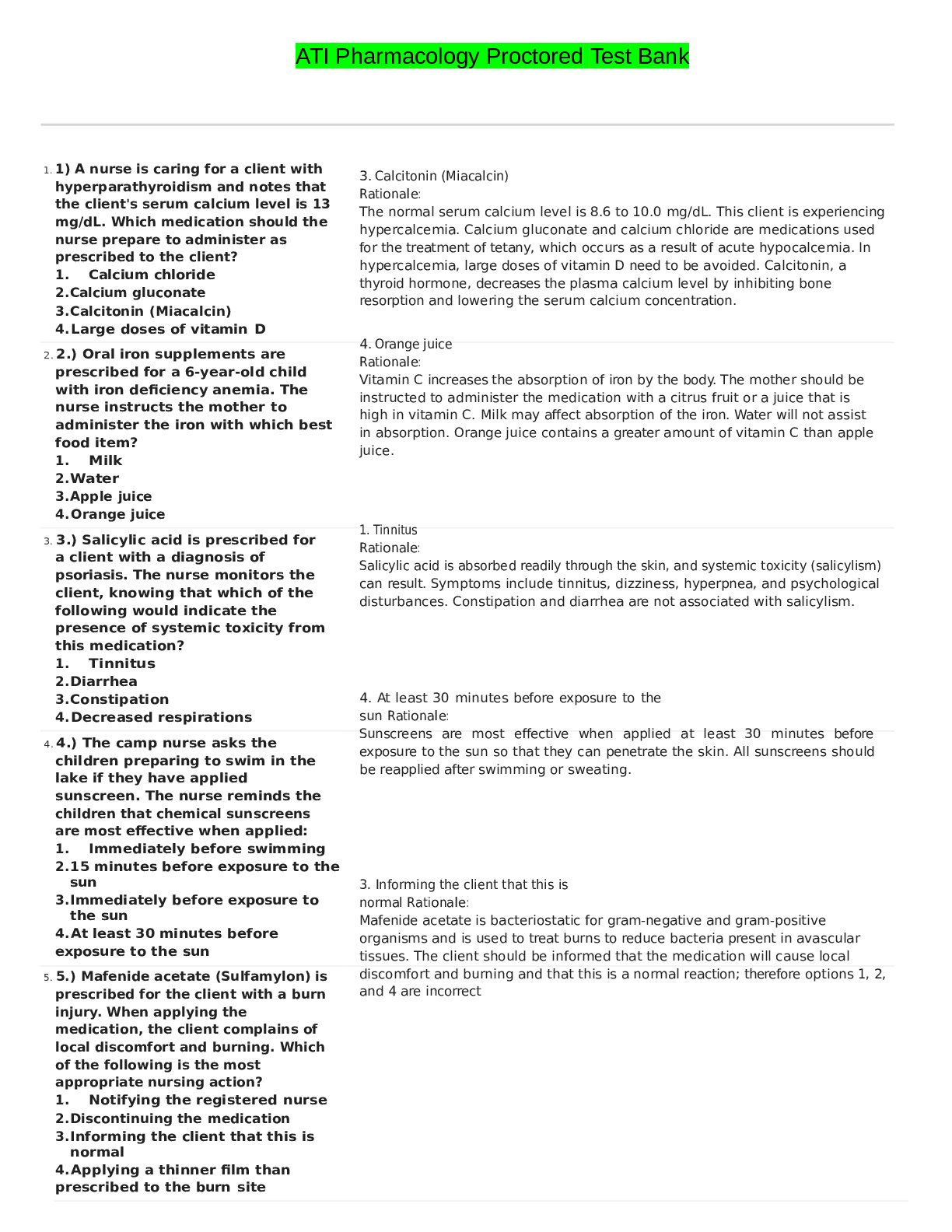
ATI PN Proctored Exam: Comprehensive, Maternal Newborn, Med-Surg, Mental Health, Nursing Care of Children, Pharmacology (Multiple Versions, 2021)
ATI PN Proctored Exam: Comprehensive, Maternal Newborn, Med-Surg, Mental Health, Nursing Care of Children, Pharmacology (Multiple Versions, 2021)
By d.occ 4 years ago
$150
23
Reviews( 0 )
$13.00
Can't find what you want? Try our AI powered Search
Document information
Connected school, study & course
About the document
Uploaded On
Sep 10, 2021
Number of pages
12
Written in
All
Additional information
This document has been written for:
Uploaded
Sep 10, 2021
Downloads
0
Views
156


